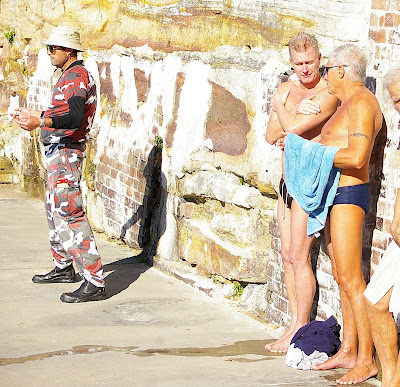

Randall Collins has recently written an innovative study of the dynamics of "Violence: A Micro-sociological Theory". In his conception of "forward panic" he makes the case that violent confrontations are oftentimes about mutual emotional entrainment, and where there is equilibrium in this respect between opposing forces, this generally ensures that confrontations will not escalate into violence. This he contrasts with situations where "forward panic" eventuates, wherein the build up of tension gains an excessive release because of a sudden change in momentum (such as an unexpected gain of advantage, capitulation, reinforcement of forces on one's side etc). So forward panic carries over into patterns of overkill, and Collins adduces numerous examples where this can lead to massacres, other events such as the beating of Rodney King (where police outnumber an individual whom they confront after an ennervating protracted chase), or a raucous party erupting into violence when the outnumbered police arrive, and attempt to disperse the gathering.
The level of detail Collins marshalls is too fine for me to reproduce here, so I'll briefly concentrate instead on the flipside of the dynamic he describes. According to him, any gathering is liable to produce its own temporary stratification, a "situational elite of those who are striving to take part, and a fringe of those excluded" (p256). In other words, there is a dynamic to emergence, and conversely, there is a dynamics of "submergence"; of outsiders looking for action, something to "jump into". It's the David Hicks, and [maybe] the Lee Harvey Oswald character type all over, but only insofar as we do not psychologise them too much, or rather, read the psychology in terms of the sum total of "emotional energy" gathered from the micro situations the individual has passed through up until that time. This explains a lot too about the opportunism of those who change their levels of commitment, and indeed their political orientation, on a situational basis.
For some unable to actualise their potential in such situations, the only remaining token of commitment and belonging are fetish objects, such as the military clothing adopted by lone males in civilian life as an expression of personal identity [pictured above]. Here action does not translate into mutual entrainment, but can only be intensified by individual movement that serves no larger purpose. It is one of the most recognisable forms of anomie in contemporary societies. These tokens can be readily purchased in army surplus stores [pictured above], unlike completion of the rites of passage leading to the more highly coveted group membership (i.e. the original context of the uniform). This disparity makes the actions of the anomic type closer to the parody of rationalisation Duchamp portrayed in his machines, which technically "worked", such as a bicycle wheel fastened to a chair, (the wheel was still capable of spinning afterall), but performed meaningless functions.
Other civlian groups have got around these inherent problems of anomie by adopting the trappings of membership in (pseudo)military organisations. Football fans can thus lay claim to membership of a "Tartan Army" for example, whilst English cricket fans can participate in "The Barmy Army". Although they typify a shortcut to attaining the status of membership in something approximating the military, one should not lose sight of how violence can still perform a ritual function for some of these groups. For example,the infamous football "crews" strive in off field confrontations with rival fans to reproduce the intensity they experience in a crowd of likeminded individuals united against a common foe during a match. The biggest mistake of English football authorities then was to separate opposing fans into "cages", for what happened was that this merely intensified their feelings of solidarity, which could then more easily later spill over into forward panic.
text by nhuthnance
photos by ahuthnance


No comments:
Post a Comment